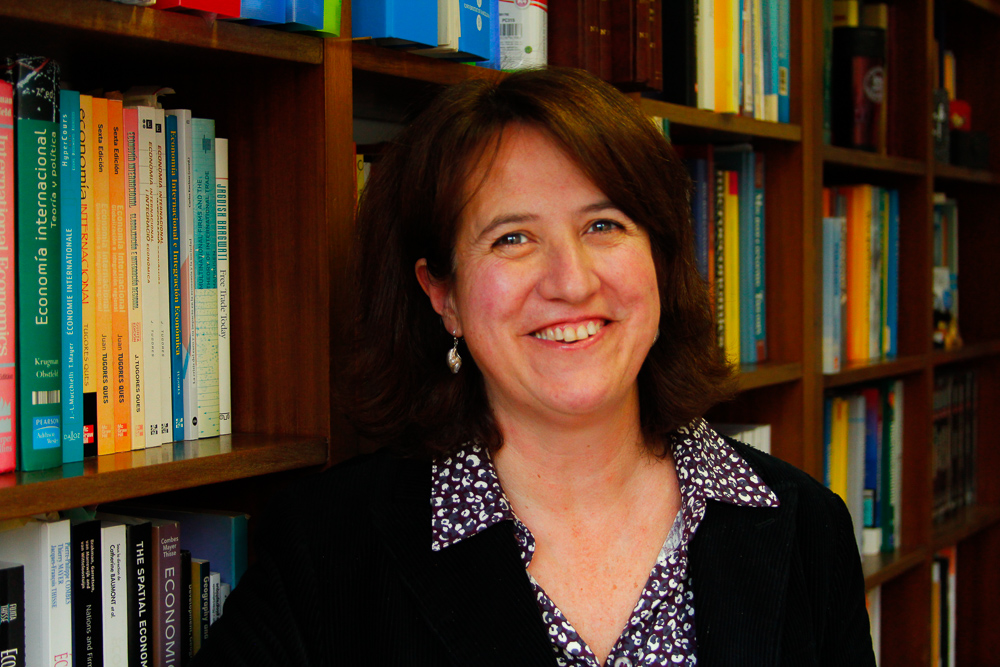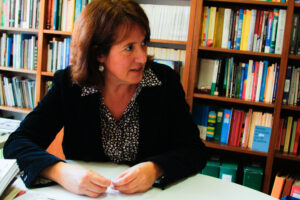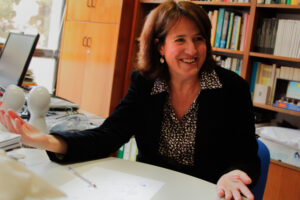04.03.2020 - 09:12
|
Actualització: 04.03.2020 - 10:12
Elisenda Paluzie has an affable manner and is quick to laugh, even when her words are consequential. While she waves her hands about or doodles, it is not easy to snap a shot where Paluzie isn’t smiling, as she often uses that as a shield. During our interview the president of the ANC reveals that there is an attempt to sideline the ANC, to disable the grassroots group. The reason for that might be the ANC’s persistence in pursuing unilateral action as a strategy for independence. Yet not only does Paluzie insist on this point, but she also clearly notes that “given the current state of affairs, renouncing unilateral action is akin to renouncing independence”.
Faced with the difficult circumstances in which the Catalan independence movement finds itself today, she no longer mentions unity, but sets a new goal and views the upcoming snap elections as a fresh catalyst for a great leap forward: “If the parties that support independence receive over 50 per cent of the popular vote, this might act as a catalyst and cause the backburner strategy to fail, eventually. These elections could turn things around”. As for herself, the president of the pro-independence grassroots group says that she would rather wait and see the kind of roadmap that gets approved before deciding whether she will stand for a second term or not.
—What’s been happening during all these months after the verdict was announced in the court case of the Catalan independence leaders?
—The Catalan people rose to the challenge, but Catalonia’s government institutions did not. I suspected that would be the case, but you never lose hope that things might turn out differently. Well, they didn’t.
—Why didn’t they make the most of the protests?
—Because we haven’t got a single, unified strategy, a shared project. Because there is no basic agreement on how to achieve independence.
—Do you still think that independence will only come if the Catalan institutions and the people work as one?
—Yes, I keep going on about that. This became blatantly obvious when the convictions were announced. It’s only normal that our parliament declares independence, so long as we are allowed to vote for parties that support independence and there is a parliament with legitimate, democratic credentials in place. It must be supported by the Catalan people, but it’s the parliament’s job [to declare independence].
—Have all efforts to form a united front for independence failed?
—They obviously have. So far, we have been unsuccessful.
—Is the independence movement split?
—There are meetings where sometimes it feels as if we are making progress, but then something from the failed independence bid of October 2017 raises its head. Stuff that happened in the autumn of 2017 and created a number of major personal and political rifts. And that has a bearing on the current situation. Some wounds have not healed.
—Does that mean we need a new leadership?
—Perhaps.
—Why has the anonymous pro-independence protest groupTsunami Democràtic slammed the brakes?
—I wouldn’t know because I was never involved in it. Still, many people believe that if the protests staged by Tsunami had endured, they would have triggered a political change. I have my doubts: if a political change is not ripe for the picking … I am not so sure about it. I tend to think that if they were not politically ready, it would have made no difference whether the protests lasted two or six days.
—Do you mean to say that we will never achieve independence unless the institutions are “ripe” for it?
—Massive rallies are much easier to sustain over time when the people can see that there is a clear, well-established goal. We had that on 1 October 2017. We had a referendum law and knew that a Yes win would lead to a declaration of independence. That’s why over two million people came out to fight for it.
—But isn’t it the other way round? Mobilisation failed to put pressure on our political leaders and institutions?
—Mobilisation must go hand in hand with the political movement. It’s not black or white, but they feed off each other. Without the 2009 non-binding, locally-held independence votes we would have never had the 2014 consultation or the self-determination referendum in 2017. The 2009 local ballots were not enough to achieve independence. One thing does not necessarily lead to the next. The first dry-run votes were held in 2009, but the actual referendum was not staged until 2017.
—Why won’t the ANC take over from Tsunami Democràtic?
—In Spain peaceful resistance is construed as an act of terror, so new tactics are required. Given the ongoing crackdown, it made sense for Tsunami’s actions to be organised through an online platform, as a means to protect themselves. Now I see people who expect Tsunami Democràtic to do the kind of stuff we grassroots groups do. Tsunami was a tool to stage certain civil disobedience actions in a safer manner.
—Do you intend to call for more massive disobedience actions?
—That requires preparation and first you need to be certain about the political goal being pursued. Shutting down your borders makes sense when you are trying to protect a declaration of independence. I see what Tsunami did as a show of strength and a rehearsal. But such actions must always protect or accompany a declaration of independence.
—If president Torra enforced the declaration, would they make sense to you?
—Sure!
—And would the ANC play ball?
—Absolutely. In a disobedience scenario you must be well aware of the risks you are prepared to take for the sake of achieving your goals. To me it would make little sense to stage an action that might lead to the ANC being outlawed and may well land its seventy-seven secretaries in jail on terror charges, unless there was a political objective. That would only make sense once we are all on the same page, politically speaking.
—When will that happen?
—If the parties that support independence receive over 50 per cent of the popular vote at the polls, it might act as a catalyst and cause the backburner strategy to fail, eventually (1).
—What if half the elected MPs who support independence do not believe in taking unilateral action?
—That could well pose a problem. But it doesn’t have to be that way: the 2017 referendum didn’t feature in the original independence plan. It is one thing to believe that a certain strategy will work, but then circumstances may lead you down a different path. The result of these elections could turn things around.
—Are you working along those lines?
—We must strive to get over 50 per cent of the popular vote at the polls. We also want to spread the word abroad a bit more. Our foreign chapters have always done that and some have done an incredible job. Nowadays we also enjoy a greater presence in international bodies.
—What is it about the ANC that bothers some people?
—What we do, what we believe in, and the fact that we continue to support unilateral action.
—Some voices within the pro-independence camp have occasionally criticised your support for unilateral action claiming it is divisive.
—They are the same people who agreed to stage a unilateral referendum [in 2017]. Was that a divisive move? Should we just sit tight until Madrid agrees to holding a referendum?
—Is it possible to renounce unilateral action?
—That would be akin to renouncing independence, given the current circumstances.
—Does unilateral action equate to confrontation?
—Not quite. The 2017 referendum was staged unilaterally. Unilateral action is about exercising self-determination, moving forward with a democratic majority and taking decisions that bring you independence without the consent of the country you wish to be independent from. How do you go about that? Hopefully without confrontation.
—Has repression weakened the ANC?
—No. However, for the past two years the ANC has had to manage the frustration and grief brought about by the 2017 failed independence bid. After many years of struggle, many people were convinced that the referendum would deliver independence and a republic. Many of our local chapters had been focusing on the political prisoners and it was hard to return to planning actions aimed at achieving independence. Campaigns such as Eines de País and working with pro-independence trade unions allowed us to get back on track. Still, we have contributed to setting up more long-term projects, which has made us better. We must re-learn to manage the process without dangling a carrot. We must learn to set new goals for ourselves. After all, we have already staged a unilateral referendum.
—The ANC remains the leading grassroots group across the nation, but has its global leadership slipped somewhat?
—There is a major ongoing attempt to sideline the ANC. This is very obvious in the case of some news outlets. The Catalan National Assembly has always run two risks: being taken over by the political parties and being rendered irrelevant. The former was more of a threat initially, but now they are at pains to sideline the ANC and discredit our actions.
—Not long ago, Catalan language newspaper Ara praised Òmnium Cultural’s stance as apposed to the ANC’s and indirectly slammed you in very harsh terms. You posted a thread on Twitter debunking some of their claims.
—They printed an editorial that aimed to bring the confrontation that exists between the political parties to the grassroots groups, which I know Òmnium were upset by. The pro-independence grassroots groups do different jobs that complement each other. They attempted to discredit us using oversimplified information which falsely claimed that our membership had dropped, even though the opposite is true: in recent years we have risen from 39,000 to over 49,000 members … They also leaked a draft document, part of our internal debate, as if it were a definitive version.
—Can you give us an example of how Òmnium and the ANC complement one other?
—We have a great working relationship with Òmnium Cultural. For example, our Eines de País campaign showed that having trade unions that support independence is necessary in order to achieve it effectively. Obviously, unions that oppose independence will find it harder to work with us. In contrast, Òmnium has a good relationship with them and they can work together in the struggle for basic rights. Both grassroots groups are necessary and complement one another. Those who would like us to fall out seem to forget that we staged separate campaigns ahead of the 2017 referendum. Òmnium has never got involved in matters of political strategy.
—Òmnium and the ANC certainly operate in different ways, with the ANC opting for a more bottom-up approach to decision-making. What are the pros and cons of that?
—On this point there is, indeed, a clash between the cultures of the two organisations. All our initiatives are approved by our own decision-making bodies and many people are involved in that process. Our advantage is that the ANC is quick to grasp what the more active elements within the secessionist camp think. Our organisation speaks in a far more natural manner. The downside is that external communication can be less efficient because we do not have a hierarchical structure.
—Should the ANC turn professional, like Òmnium Cultural?
—No. We have achieved a nice balance the way we are now. We employ about twenty staff in a technical and admin capacity, but our strength lies with our volunteers. They contribute many hours of their own time and this is extremely valuable. It happens at every level: the secretariat, the local groups, the special interest groups, the chapters abroad … It is a very positive thing and it affords the ANC a great deal of freedom.
—Soon there will be an election to choose the ANC’s leadership. Will you run?
—I haven’t decided.
—But they’re just around the corner!
—We’ve just begun to discuss our strategy and later we will elect the people who will fill the posts. There is a one-month gap between the two. Before deciding if I should run again, first I want to see what roadmap we agree on for the coming year. Besides, you cannot run for the job of president of the ANC as such: first you need to be elected to the secretariat and its seventy-seven members then choose the president. So things are very different now compared to two years ago, when a whole set of circumstances meant I ended up as president. Now I know the ANC much better from the inside and I want to wait and see who is in the secretariat. It goes both ways, as perhaps the new secretariat will not want me as president. Likewise, now I know what it’s like to work with a secretariat that makes all the decisions and first I want to see who’s in it.
—Do you have a roadmap in mind?
—I’m comfortable with last year’s, as well as the new one currently being debated at a local level.
—Could you give us a rundown of that?
—We keep the goal of achieving 50 per cent of the popular vote in the next elections. If we got over 50 per cent, it would contribute to achieving independence unilaterallymanaged that, it would provide a huge boost for the independence movement. The news headlines alone would mark a turning point. This element would contribute to achieving independence unilaterally. We also propose to continue building Catalonia’s own structures as a nation. Another key objective is to give more prominence to our interest groups and to have many experts in every working area.
—Would building those structures be detrimental to the ANC’s rallying efforts?
—No, the latter is more important. I only emphasised building structures because it is more of a novelty. The ANC is well-known for staging political rallies that aim to influence policy and they are our defining feature. Obviously, we must carry on with them.
—Will the ANC support Primàries in the upcoming snap elections or get involved in any way (2)?
—Looking at the state of the secretariat’s roadmap, which will be rolled out at our ordinary general assembly, there are no proposals to get directly involved in the next elections. However, it’s true that we still have some ground to cover and there’s a general assembly yet to be held. Personally I think that the ANC went as far as it could go in last year’s local elections without compromising our independence from the political parties, which is something precious we should preserve.
—What was the significance of Saturday’s event in Perpignan?
—It was a new demonstration of the mobilization capacity of the independence camp, standing above partisan fights and focusing on basic issues: support for exile, celebration of international legal victories, appreciation to the people in Northern Catalonia and persistence in demanding independence, the most significant cry in Perpignan.
—Have we allowed repression to become a given?
—That is a risk.
—How do you feel about the Madrid-Barcelona talks [that are starting this week]?
—I’ve already mentioned the danger that these talks pose: they might give the impression that the conflict is being resolved, the international community might breathe a sigh of relief and so the talks might turn into a PR opportunity for Pedro Sánchez. Having said that, I understand ERC’s argument when they say that you cannot shun dialogue and allow your opposite number to chalk that one up. If the talks revolve around self-determination, I’ll have no objections. But my question is this: once Madrid has made it perfectly clear that they do not wish to discuss self-determination, what will the point of those talks be? I don’t see what the plan could possibly be.
—When you stated that the Comuns could not sit at both sides of the negotiating table (3), there was quite a ruckus.
—Well, it’s part of an attempt to portray the ANC as purists who exclude others, but that’s not who we are. [What I said] was common sense. What kind of negotiating power can you expect to have when one actor receives information from both sides and you don’t know whose side they are on. Eventually the Comuns will sit a representative on Madrid’s side of the table.
—Spanish Minister Manuel Castells.
—Right off the bat, I welcomed the fact that Castells would be one of Madrid’s representatives because he has spoken in favour of self-determination. But I was disappointed when he said he wouldn’t stand for self-determination because, as a Spanish minister, he has sworn to uphold the constitution. That doesn’t strike me as a valid reason, because whether the Spanish constitution allows a self-determination referendum or not is open to interpretation.
—Òmnium Cultural is campaigning for an amnesty [for the political prisoners]. Does the ANC agree?
—Obviously we do, on this point. The consensus we reached ahead of the talks with Madrid was that Catalonia would demand an amnesty as well as self-determination. However, we prefer to focus on other stuff in our own campaigns.
—Such as what?
—We have recently commissioned a qualitative sociological study to survey a range of demographic profiles on the subject of independence. We would like to zero in on those who currently oppose it, but are not a lost cause. We want to find out what prevents us from getting to them. Our reasons for an independence campaign now cannot be the same arguments we used four years ago. Many things have happened since and we want to study their effect.
—Can you offer any hints?
—The survey is not finished yet, but I can say that we have identified six different profiles. There are two distinct groups within the pro-independence bloc (48 per cent of the Catalan electorate): 35 per cent support independence no matter what, whereas the remaining 15 per cent is more volatile and context-dependent. The latter group also needs specific work because we don’t want to lose them. We always talk about growing our support base, but it is equally important not to lose the support we already have. Other profiles [uncovered by the survey] are hardly surprising, but there is one that we feel we can work on: largely apolitical voters whose polling record is random. We’re very keen to know their perceptions and impressions of the last few years.
—Will you use the economy as an argument?
—As I said, we don’t have the final results yet. But Madrid’s panic-mongering does seem to have had an impact on middle-ground voters. They are well aware of Catalonia’s grievances, from poor funding to the lack of infrastructure, but they believe the narrative that the 2017 independence bid has made everything worse. So Spain’s scare-mongering campaign has been effective.
—More so than the crackdown on independence supporters?
—Yes, as far as this particular group is concerned. They do not support independence and repression has not hit them personally. If they didn’t feel close to the idea of independence to begin with, the whole narrative of fear has left them feeling even less inclined to support it.
_________
Translator’s notes:
(1) Since 2017 ERC and others on the secessionist camp have advocated a pragmatic approach whereby the goal of independence will be left on the back burner until a large majority of Catalan voters support it.
(2) In the 2019 local elections the ANC decided to endorse a number of grassroots, bottom-up pro-independence slates known as “Primàries”.
(3) Catalonia’s Comuns party are effectively the Catalan chapter of Unidas Podemos, the PSOE’s current coalition partner in the Spanish government.







